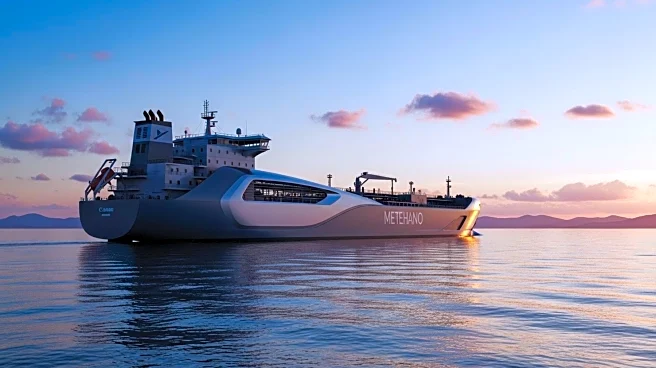What's Happening?
The Fratelli Cosulich Group has launched the world's first methanol-powered bunker tanker, named Maya Cosulich, in China. This vessel is designed by SeaTech Solutions International and built by Taizhou Maple Shipyard. It is set to operate in Singapore under a fixed-rate time-charter contract with Trafigura, a global commodities trader. The tanker will be managed by Fratelli Cosulich Bunkers Singapore and is equipped to carry both green methanol and biofuels. The vessel features dual-fuel generator sets and an onboard battery storage system to optimize fuel use. The launch marks a significant step in expanding infrastructure for alternative fuel operations.
Why It's Important?
The introduction of the Maya Cosulich represents a pivotal advancement in sustainable marine fuel technology, potentially reducing the carbon footprint of maritime operations. As Singapore is a major global shipping hub, the deployment of this methanol-powered tanker could influence other ports to adopt similar technologies, promoting cleaner fuel alternatives. This development aligns with global efforts to reduce emissions in the shipping industry, offering a competitive edge to companies investing in green technologies. The collaboration between Fratelli Cosulich Group, TFG Marine, and the Maritime and Port Authority of Singapore underscores the importance of partnerships in achieving environmental goals.
What's Next?
The Maya Cosulich is expected to arrive in Singapore by the end of 2025, where it will begin operations. The vessel's performance and impact on the market will be closely monitored, potentially setting a precedent for future methanol-powered ships. The success of this initiative may encourage further investment in alternative fuel technologies, prompting regulatory bodies to update standards and guidelines for methanol bunkering. Additionally, the construction of a sister ship, Anna Cosulich, is underway, indicating a continued commitment to expanding the fleet of eco-friendly vessels.
Beyond the Headlines
The launch of the Maya Cosulich could have broader implications for the shipping industry, including shifts in fuel procurement strategies and increased demand for methanol production. This transition may also influence global trade patterns, as countries with methanol production capabilities could become key players in the maritime fuel market. Furthermore, the adoption of methanol as a marine fuel may drive innovation in engine design and fuel efficiency technologies, contributing to long-term sustainability in the sector.









